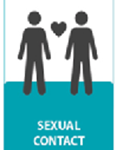Chlamydia

What is Chlamydia?
Chlamydia is the most frequently reported sexually transmitted infection (STI) in the United States and is caused by bacteria. It is treatable and curable with the correct antibiotics.
How is it spread?
Chlamydia is spread from person to person through anal, oral, and vaginal sexual contact or by sharing unclean sex toys. A chlamydia infection can occur in the rectum, throat, or penis and vagina. A pregnant woman can give the infection to her baby during childbirth. It can cause serious eye infection or pneumonia in the newborn.
Who is at risk for chlamydia?
Anyone who is sexually active or shares unclean sex toys can get chlamydia. Risk factors for chlamydia include:
- Having a partner who has the disease but has not been treated.
- Anyone aged 15 to 24.
- Men who have sex with men.
- Transgendered women.
- Anyone not using a condom or incorrect usage.
- Being Black or Hispanic.
- Anyone with new or multiple partners.
- Anyone with a partner who has other partners.
- Anyone who infrequent tests for infections.
How can I lower my risk of getting chlamydia?
Everyone can lower risk of infection by practicing safe sex.
- Always use a condom. Condoms used properly reduce but do not eliminate risk.
- Maintain a monogamous relationship with someone who has been tested and does not have an infection.
- Reduce number of partners. Having multiple partners greatly increases risk of infection.
- Talk to your partner and healthcare provider about your sexual activity.
- Get tested regularly.

What are the symptoms of chlamydia?
Chlamydia often has no symptoms. If symptoms do occur, it may be several weeks after having sex with someone who has the infection. This is why regular testing is so important.
Rectal Symptoms |
|
|
|
| * Rectal pain | * Sore throat with redness | * Penis discharge | * Abnormal vaginal discharge |
| * Discharge | * White spots or mouth sores | * Burning when peeing | * Burning when peeing |
| * Bleeding | * Difficulty swallowing | * Sometimes pain or swelling in testicles | * Bleeding between periods or after sex |

What test is done to diagnose chlamydia?
Chlamydia is diagnosed from a urine sample or by taking a swab from the genitals, anus or throat. The sample is sent to a lab, and results are provided within a few days.
Full STI testing (Chlamydia, Gonorrhea, Herpes, Syphilis, Trichomoniasis, and HIV) is recommended for all people who are sexually active. Full testing is recommended with every new partner.

Schedule an appointment at Lexington-Fayette County Health Department’s STI Clinic
Lexington-Fayette County Health Department operates a specialty STI Clinic that will test, diagnose and treat those exposed to or with current STIs.
What is the treatment?
The Center for Disease Control and Prevention recommends the following treatment.
- Doxycycline 100 mg taken orally twice a day for 7 days.
- Alternative treatment: Azithromycin 1 gram orally in a single dose (not recommended for rectal infections).

Refrain from all sexual activity (including oral sex) until completion of a Doxycycline 7-day course and for 7 days after taking one dose of Azithromycin because you can still spread the infection. It takes time for the medicine to clear the infection and for symptoms to go away. Abstain from all sexual activity (including oral sex) with all sexual partners in the previous 60 days until all have been tested and treated.
Retesting (Test of Cure)
Everyone should have another blood test (called a test of cure) 4 weeks after completing the medicine to make sure the treatment has worked. Lexington-Fayette County Health Department’s specialty STI Clinic provides retesting.
Reinfection
 Chlamydia will not go away on its own. Without treatment, you and your partner will continue to spread the infection back and forth. All sexual partners in the last 60 days need to be tested and treated for the infection, even if they have no symptoms. If your partners are not treated, you can become reinfected with chlamydia.
Chlamydia will not go away on its own. Without treatment, you and your partner will continue to spread the infection back and forth. All sexual partners in the last 60 days need to be tested and treated for the infection, even if they have no symptoms. If your partners are not treated, you can become reinfected with chlamydia.
What happens if I don’t get treatment?
 Disease complications can occur when an infection is untreated, or treatment is delayed. People with a uterus may develop pelvic inflammatory disease (PID) which can lead to infertility, ectopic pregnancy and Reiter syndrome (reactive arthritis). People with a penis may develop infection near the testicles, prostate gland infection and Reiter syndrome (reactive arthritis). Untreated chlamydia increases your chances of getting other sexually transmitted diseases including HIV.
Disease complications can occur when an infection is untreated, or treatment is delayed. People with a uterus may develop pelvic inflammatory disease (PID) which can lead to infertility, ectopic pregnancy and Reiter syndrome (reactive arthritis). People with a penis may develop infection near the testicles, prostate gland infection and Reiter syndrome (reactive arthritis). Untreated chlamydia increases your chances of getting other sexually transmitted diseases including HIV.





